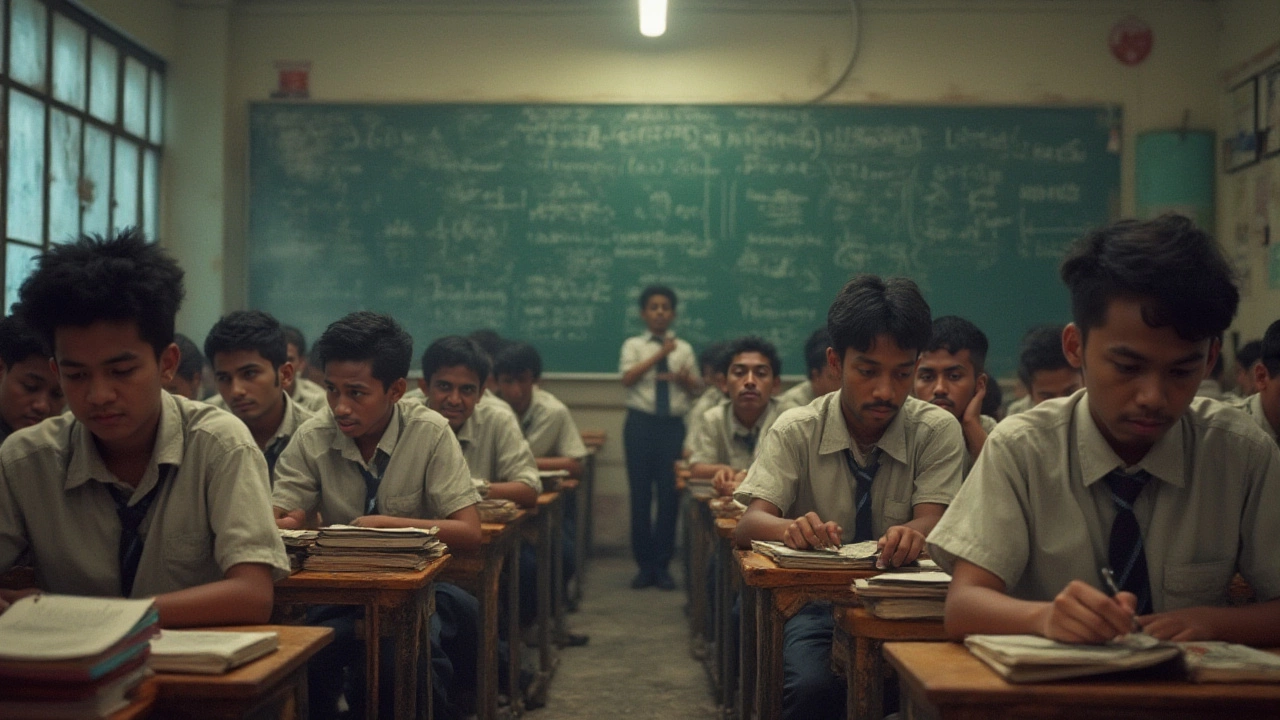Imagine landing in a new country, plans big and bright in your head, and suddenly—boom—you hit a wall you never saw coming. Not an actual wall, but that wall of complex paperwork, language twists, weird food, and rules nobody bothered to translate. Some places crank this up to eleven, making their schools global legends for chewing up and spitting out even the toughest students. But which country really takes the trophy for the hardest to study in? Spoiler alert: it’s not just about tough exams. It’s about life, culture, and the grit to survive the pressure cooker.
Why ‘Hardest’ Isn’t Just About Books
When people ask what the hardest country to study in is, most jump straight to academics—giant textbooks, killer math problems, or endless hours in the lab. But let’s rewind. It’s more than that. Hard can mean everything from figuring out a subway system that barely has signs in English, to understanding what in the world your professor is saying through a thick accent, to trying to make friends when you don’t get the jokes. In Tokyo, you might never see your classmates again after class—they all bolt home to study. In Paris, you could be wading through bureaucracy so dense, it makes your brain ache (and that’s before you touch the homework).
Even the food might turn against you. A friend of mine was ready to climb the Great Wall, but one bite of stinky tofu in Beijing had him reconsidering his whole semester abroad. My own daughter Nalini once texted me from her dorm in Stockholm: "Dad, how do you eat pickled herring without looking like you’re being punished?" It’s those daily things, on top of schoolwork, that stack up fast.
The statistics agree. According to the OECD, international students say language barriers, cultural adaptation, and managing loneliness are just as tough as their actual studies. If you ever get the chance, ask someone who went to college somewhere hard like South Korea or Germany—they’ll talk about life almost as much as lectures. So if you want an easy ride? Stick to what you know. Want a challenge? Buckle up.
The Usual Suspects: Countries with Notorious Academic Pressure
South Korea. The name alone can spark a shiver in anyone who’s watched a documentary on their university entrance exams. The pressure there starts in preschool and ramps up. Their biggest college exam, the Suneung, literally shuts the country down—flights delayed, businesses closed, police escorts for late test-takers. Now, think about actually attending a Korean university, where group projects mean grinding together until midnight and a ‘B’ feels like a disaster.
China comes next. The gaokao, that infamous college entrance test, makes headlines every year. One slip-up and not only your year, but your whole life path can change. Once you’re in, Chinese universities have huge class sizes—sometimes hundreds in a lecture. That means if you zone out, nobody’s noticing or helping you catch up. Students are expected to memorize, not just understand. The discipline is fierce. Here’s a quick side-by-side:
| Country | Main Entrance Exam | Average Study Hours Per Week | International Language Standards |
|---|---|---|---|
| South Korea | Suneung | 50+ | Low outside top schools |
| China | Gaokao | 60+ | Low in undergrad |
| France | Baccalauréat | 35–40 | Medium |
| Germany | Abitur | 40+ | Medium–High |
But let’s not forget France and Germany. In France, university is public and often cheap, but the system expects you to be independent fast. Professors can sometimes hand you a syllabus and disappear until the final. In Germany, the language is a monster unless you already speak it. Even with solid German, the lectures are dense—no hand-holding, and you’re expected to chase down professors for help.
What’s the hardest? Here’s what students themselves tend to say: It’s less about which country, and more about matching your own style to the country’s system. If you’re all about group work, Korea or Japan might feel isolating. If you need clear instructions, good luck in France. Each country throws its own curveball.

Culture Shock and Survival: The Hidden Curriculum
The culture shock hits hardest right when you need your brain the most. Grab lunch in Japan and notice everyone eating alone, heads down. Go to Italy, and you’ll struggle to get anything done during a two-hour lunch break. In Germany, the bureaucracy will have you running between offices just to register for basic classes. One friend I met in Berlin literally had to fill out paperwork to get a form so they could fill out another form.
Beyond the red tape and customs, there’s the way people interact in classrooms. In the U.S., discussion is king. You’re expected to jump in, even challenge the professor. Try that in some Asian countries and you’ll get a room full of stares. In Scandinavian countries, hierarchy is flatter—call your professor by their first name! But try being a jokester in class, and people might just blink at you in confusion.
Social life isn’t always easy either. Making friends can be tough if the local students hang out in tight-knit groups. In places like Finland or South Korea, meeting up often happens only after repeated invites and patience. The mental strain adds up. According to a 2023 survey from QS, 35% of international students struggled most with loneliness—way more than failed tests or tricky paperwork.
So how do you survive? Here are some street-smart tips:
- Attack the language barrier head-on, even if you sound silly. Locals will appreciate the effort.
- Get out of your shell. Go to school events, clubs, or even those dorky local tours—someone else is probably looking for friends too.
- If you hit a mental rough patch, reach out. Schools often have counseling centers, even if they’re tucked away.
- Make ‘yes’ your default answer, at least for the first month. Try new food, take weird classes, join the pickleball team just once. You never know what’ll stick.
Life outside class matters as much as the grades you chase. Adapt or struggle—it’s your move.
Stories from the Frontlines: What Students Say
Let’s swap the statistics for some honest stories. My cousin, a rock-solid engineering student, headed to South Korea expecting hard homework—and got hammered by the social scene too. He couldn’t crack jokes in Korean and half the time, cultural hints flew right over his head. The real test wasn’t just exams, but feeling left out at group lunches or not knowing local study hacks.
Another friend moved to Germany for med school and got a reality check. He could read and write German, easy. But when his professor launched into a thick Bavarian dialect, he felt like a kindergartner again. Turned out, German slang is a whole other beast, and the academic writing was just as tricky. To keep up, he joined study circles and bought coffee for anyone willing to explain tough topics. No shortcuts—he just powered through, week by week.
I’ve heard similar things from students who tried France, especially at the top "grandes écoles". One American said, "I thought my French was okay. Then my professor started quoting Voltaire, and I realized I’d learned classroom language, not real-life conversation!" The shock isn’t just academic, but personal.
Some places, like the UK or Australia, have their own curveballs. The UK’s grading is brutally honest (70% is an excellent grade—back home, that gets you grounded) and plagiarism policies are strict. Universities in Australia? They might feel laid back until you’re knee-deep in group work and realize everyone else has done this since high school.
The bottom line: Ask five international students, you’ll hear five different stories. The hardest part can be wildly different for each. Some thrive on difficulty and love chasing the hard stuff. Others just want a degree and a few good memories. The best survivors are the ones who stick with it, learn from locals, and laugh off the flops instead of letting them knock them down.

Which Country Wins? Or Does It?
So where’s the hard-line answer? Based on research and way too many swap stories over late-night chats, South Korea and China often top the list for raw academic grind. But France and Germany can be just as brutal in their own unique ways—bureaucracy, independence, language, and cultural quirks. The toughest country depends on what kind of challenge you dread most. If non-stop study is your nightmare, avoid East Asia. If you hate red tape, side-step Western Europe. Yet, some students hunt for challenges and land on their feet, no matter where they go.
Quick numbers from UNESCO’s last survey: about 85% of students said social and personal adaptation mattered more than grades. The academic side was rarely the dealbreaker—life outside class weighed much heavier. If you’re picking a country to study in, look deeper than course rankings. Talk to people who have lived there. Watch YouTube vlogs, go on Reddit, or fire off questions to alumni groups. Every system is tricky in its way—and the best stories come from those who stuck around, learned the ropes, and came out wiser.
So, the “hardest” country to study isn’t a clear-cut crown. It’s a mix of pressure, paperwork, and plain old personal fit. Some climb Everest for the thrill. Others just want a hill that fits their stride. Whichever path you choose, remember to tell your story—and don’t be afraid to laugh at yourself along the way.

